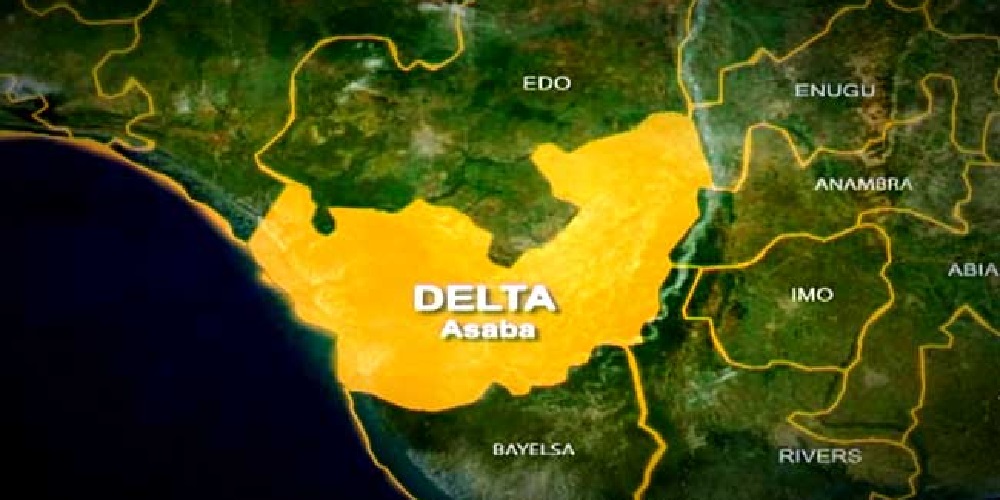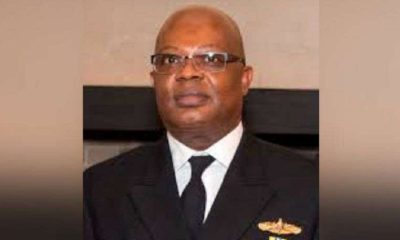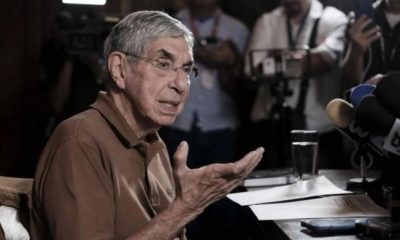News
Despite operational problems, NNPC Ltd’s state of emergency on crude oil production yields 1.61mbpd in July 2024

By Kayode Sanni-Arewa
The declaration of a state of emergency by the Nigerian National Petroleum Company Limited [NNPC Ltd] on crude oil production has yielded a positive outcome with the increase recorded in daily production from 1.25 million barrels per day [mbpd] in June to 1.61mbpd as of July 23, 2024.
Group Chief Executive Officer of NNPC Ltd, Mr Mele Kyari had declared the state of emergency at the end of June/early July in a speech at the 2024 Nigeria Oil and Gas (NOG) Energy Week in Abuja.
Mr Kyari said the move was directed towards increasing Nigeria’s crude oil production and growing its reserves.
According to him “We have decided to stop the debate. We have declared war on the challenges affecting our crude oil production. War means war. We have the right tools. We know what to fight. We know what we have to do at the level of assets. We have engaged our partners. And we will work together to improve the situation.”
He had explained that a detailed analysis of assets showed that Nigeria could conveniently produce two million barrels of crude oil per day without deploying new rigs, but the major impediment to achieving that remained the inability of players to act in a timely manner.
“War will help NNPC Ltd and its partners to speedily clear all identified obstacles to effective and efficient production such as delays in procurement processes, which have become a challenge in the industry,” he said.
And about a month after, the Nigerian Upstream Petroleum Regulatory Commission (NUPRC) has just announced the increase in the daily crude oil production in the country from 1.25 million barrels per day (mbpd) in June to 1.61 mbpd as of July 23rd.
The increment in output, according to the Commission, was in spite of significant operational challenges especially affecting terminals at Bonny, Brass, and Forcados, prompting the Commission to employ end-to-end production monitoring and a mass balance methodology to accurately account for losses and differentiate them from operational losses.
The announcement by the NUPRC has generated positive sentiments in the oil sector of the national economy with its potential for more revenue accretion to the federal government’s coffers.
Chief Executive Officer of the Commission, Engineer Gbenga Komolafe dropped the piece of good news at the House of Representatives’ Special Committee’s Two-Day Public/Investigative Hearing on Oil Theft/Losses in Abuja at the weekend.
An elated Komolafe said that Nigeria remained Africa’s largest producer of crude oil, boasting proven reserves of 37.50 billion barrels and a production capacity of approximately 2.19 million barrels per day (mbpd).
According to him: “Nigeria is facing significant challenges, especially affecting terminals at Bonny, Brass, and Forcados. This has prompted the Commission to employ end-to-end production monitoring and a mass balance methodology to accurately account for losses and differentiate them from operational losses.
“The NUPRC has introduced several innovative measures to enhance transparency and accountability.”
He listed other innovations towards accountability to include the Advanced Cargo Declaration (ACD) Regulation that ensures no crude oil is exported without proper accounting and that assigns a unique identification number (UIN) to each cargo; the Upstream Metering Regulation, which mandates reliable metering systems to account for all hydrocarbon production and exports; and, real-time cargo tracking and digital documentation to improve visibility and efficiency in cargo operations.
He explained that with a mandate to oversee the exploration, development, production, and lifting operations of crude oil and natural gas, “the NUPRC regulates both the technical and commercial aspects of operations in the nation’s Upstream Petroleum Sector, ensuring optimal tax revenue generation, royalty collection, and cost benchmarking.
“Other areas of major focus for the Commission include ensuring business continuity and production sustainability at low costs, accurate measurement and timely payment of royalties, uninterrupted crude oil and natural gas supply to the domestic market, and maintaining safety, health, and environmental standards.
“The Petroleum Industry Act 2021 grants the Commission several statutory mandates in the areas of calibration and certification of metering systems and equipment, publication of reports and statistics on upstream operations, regulatory oversight and issuance of quality and quantity certificates for exports, and determination of fiscal prices for crude oil and condensate.”
Komolafe stated that the strategies of the Commission aimed to optimise production, enhance regulatory oversight, and ensure accurate measurement and accounting.
He further said that the Commission had prioritised improving rig availability and reducing non-productive time through unlocking heavy crude oil reserves via industry workshops.
“These initiatives also support new Petroleum Prospecting License (PPL) awardees to achieve their first Oil, among other initiatives,” he explained.
He reaffirmed NUPRC’s commitment to continued engagements with stakeholders to optimise Nigeria’s Oil production and maintain its leadership position in Africa’s energy sector.Despite operational challenges, NNPC Ltd’s state of emergency on crude oil production yields 1.61mbpd in July 2024
The declaration of a state of emergency by the Nigerian National Petroleum Company Limited [NNPC Ltd] on crude oil production has yielded a positive outcome with the increase recorded in daily production from 1.25 million barrels per day [mbpd] in June to 1.61mbpd as of July 23, 2024.
Group Chief Executive Officer of NNPC Ltd, Mr Mele Kyari had declared the state of emergency at the end of June/early July in a speech at the 2024 Nigeria Oil and Gas (NOG) Energy Week in Abuja.
Mr Kyari said the move was directed towards increasing Nigeria’s crude oil production and growing its reserves.
According to him “We have decided to stop the debate. We have declared war on the challenges affecting our crude oil production. War means war. We have the right tools. We know what to fight. We know what we have to do at the level of assets. We have engaged our partners. And we will work together to improve the situation.”
He had explained that a detailed analysis of assets showed that Nigeria could conveniently produce two million barrels of crude oil per day without deploying new rigs, but the major impediment to achieving that remained the inability of players to act in a timely manner.
“War will help NNPC Ltd and its partners to speedily clear all identified obstacles to effective and efficient production such as delays in procurement processes, which have become a challenge in the industry,” he said.
And about a month after, the Nigerian Upstream Petroleum Regulatory Commission (NUPRC) has just announced the increase in the daily crude oil production in the country from 1.25 million barrels per day (mbpd) in June to 1.61 mbpd as of July 23rd.
The increment in output, according to the Commission, was in spite of significant operational challenges especially affecting terminals at Bonny, Brass, and Forcados, prompting the Commission to employ end-to-end production monitoring and a mass balance methodology to accurately account for losses and differentiate them from operational losses.
The announcement by the NUPRC has generated positive sentiments in the oil sector of the national economy with its potential for more revenue accretion to the federal government’s coffers.
Chief Executive Officer of the Commission, Engineer Gbenga Komolafe dropped the piece of good news at the House of Representatives’ Special Committee’s Two-Day Public/Investigative Hearing on Oil Theft/Losses in Abuja at the weekend.
An elated Komolafe said that Nigeria remained Africa’s largest producer of crude oil, boasting proven reserves of 37.50 billion barrels and a production capacity of approximately 2.19 million barrels per day (mbpd).
According to him: “Nigeria is facing significant challenges, especially affecting terminals at Bonny, Brass, and Forcados. This has prompted the Commission to employ end-to-end production monitoring and a mass balance methodology to accurately account for losses and differentiate them from operational losses.
“The NUPRC has introduced several innovative measures to enhance transparency and accountability.”
He listed other innovations towards accountability to include the Advanced Cargo Declaration (ACD) Regulation that ensures no crude oil is exported without proper accounting and that assigns a unique identification number (UIN) to each cargo; the Upstream Metering Regulation, which mandates reliable metering systems to account for all hydrocarbon production and exports; and, real-time cargo tracking and digital documentation to improve visibility and efficiency in cargo operations.
He explained that with a mandate to oversee the exploration, development, production, and lifting operations of crude oil and natural gas, “the NUPRC regulates both the technical and commercial aspects of operations in the nation’s Upstream Petroleum Sector, ensuring optimal tax revenue generation, royalty collection, and cost benchmarking.
“Other areas of major focus for the Commission include ensuring business continuity and production sustainability at low costs, accurate measurement and timely payment of royalties, uninterrupted crude oil and natural gas supply to the domestic market, and maintaining safety, health, and environmental standards.
“The Petroleum Industry Act 2021 grants the Commission several statutory mandates in the areas of calibration and certification of metering systems and equipment, publication of reports and statistics on upstream operations, regulatory oversight and issuance of quality and quantity certificates for exports, and determination of fiscal prices for crude oil and condensate.”
Komolafe stated that the strategies of the Commission aimed to optimise production, enhance regulatory oversight, and ensure accurate measurement and accounting.
He further said that the Commission had prioritised improving rig availability and reducing non-productive time through unlocking heavy crude oil reserves via industry workshops.
“These initiatives also support new Petroleum Prospecting License (PPL) awardees to achieve their first Oil, among other initiatives,” he explained.
He reaffirmed NUPRC’s commitment to continued engagements with stakeholders to optimise Nigeria’s Oil production and maintain its leadership position in Africa’s energy sector.
News
Delta issues 21-day ultimatum to unapproved schools

The Delta State Government has vowed to shut down all unapproved nursery and primary schools across the state.
The measure is being taken “to sanitise the private sector participation in the primary education sector in the state.”
This was contained in a government special announcement signed by the Director of Public Communication/Functioning Permanent Secretary in the State Ministry of Information, Theresa Adiabua Oliko.
Copies were made available to journalists in Warri on Thursday.
The government, however, advised owners of all unapproved primary schools across the state to “upgrade” within the 21-day ultimatum or risk being shut down.
The public announcement partly reads, “It is hereby announced for the information of the public, particularly owners of private nursery and primary schools in Delta State, that the government, pursuance to its responsibility to sanitise the private sector participation in the primary education sector in the state, that all unapproved primary schools in the state are hereby given a 21-day ultimatum to upgrade their infrastructure and formalise their status with the ministry of primary education with immediate effect.
“Failure to comply with this directive will attract severe sanctions, including outright closure of all such schools.
“The 21-day ultimatum has become imperative as a result of the proliferation of unapproved private schools whose poor infrastructural facilities, unqualified teachers and unhealthy operational environment have become worrisome to the state government.”
News
I’m not behind Elisha Abbo’s sacking from Senate – Akpabio

The Senate President, Senator Godswill Akpabio on Thursday, berated former lawmaker representing Adamawa North Senatorial District, Elisha Abbo, saying he has no hand in his removal from the National Assembly.
The clarification was made in a statement issued in Abuja by Akpabio’s media aide, Eseme Eyiboh.
Abbo was sacked by the Court of Appeal sitting in Abuja on October 16, 2023.
The judgment delivered by a three-member panel presided over by Justice C.E. Nwosu-Iheme ordered the Independent National Electoral Commission to issue a Certificate of Return to Amos Yohanna of the Peoples Democratic Party as the duly elected lawmaker representing the area at the Senate.
The appellate court vacated the tribunal judgment which had earlier affirmed Abbo of the All Progressives Congress as the winner of the senatorial election.
But speaking on a live programme on Arise Television on Wednesday, Abbo blamed Akpabio for his predicament.
The Adamawa politician also accused the Senate President of running the Red Chamber like an emperor.
This was even as he condemned the suspension of the senator representing Kogi Central, Natasha Akpoti-Uduaghan, who is presently battling to retain her mandate.
Reacting, Akpabio said he was shocked to hear Abbo blame him again for his ouster from the Senate barely two years after apologising to him.
He said, “It is sad and regrettable that despite publicly retracting a similar allegation in 2023—after admitting that his earlier accusation was premature and based on the available information at our disposal—Mr. Abbo has once again embarked on a campaign of misinformation and blame transfer.
“Following a discussion with the Senate President last year, Mr. Abbo himself acknowledged that Senator Akpabio had ‘no involvement’ in the judicial process that led to his removal. It is puzzling that he would now return to the same baseless allegations he once renounced.”
Continuing, Akpabio emphasised that it was the court and not him that determined his fate before he was consequently removed.
The former governor asserted that he, therefore, found it illogical and irresponsible that Abbo could turn around and allege that he influenced the judgment that he accepted at the time.
“It is there in the papers (see PUNCH Newspaper of 18th October 2023). Mr Abbo has also sought to create the impression that he was unjustly denied official benefits following his ouster. He claims entitlement to salaries, allowances, and even an official vehicle, despite the court’s declaration that his tenure was null and void ab initio.
“If any of Abbo’s claims for payment did not reach the desk of the Senate President, it is because they failed to meet these lawful standards—not because of any personal or political vendetta. It is unfortunate that instead of accepting the consequences of his legal and political failings, Abbo continues to resort to media theatrics and reckless finger-pointing.
“Akpabio remains focused on the noble task of nation-building, providing purposeful leadership in the Senate, and strengthening democratic institutions—especially the independence of the judiciary. He will not be distracted by the antics of individuals who seek to rewrite history to mask personal failures.
“We urge Mr Abbo to reflect deeply, respect the rule of law, and focus on rebuilding the confidence of his constituents if he hopes to return to public life. Nigeria’s democracy can only thrive when its actors show maturity, responsibility, and an abiding respect for the truth,” the statement added.
News
NCAA to sanction airlines over deportees maltreatment

The Nigeria Civil Aviation Authority has strongly cautioned international airlines against the increasing complaints from passengers who are transported partway to their destinations, only to be deported back to Nigeria.
The NCAA criticised this practice, emphasising that it has led to considerable distress for passengers and damaged the reputation of Nigeria’s aviation industry.
The NCAA’s Director of Consumer Protection and Public Affairs, Michael Achimugu, announced this in a signed statement on Thursday.
“These actions, which involve the refusal of boarding or denial of entry at intermediate or transit stops due to visa and travel restrictions, are completely unacceptable,” he said.
The NCAA stressed that airlines are responsible for informing passengers of any potential obstacles to their entry before their journey begins.
“Passengers should not be put in a position where they are denied entry or returned to Nigeria only upon arrival at transit stops,” Achimugu added.
Referring to the Nigeria Civil Aviation Regulations 2023 (Part 19.21.1.1), the NCAA reiterated that airlines and their agents are obligated to inform travellers of any potential entry restrictions before departure.
“Airlines must take appropriate measures to screen and provide passengers with accurate, up-to-date information regarding their travel documents and visa requirements before issuing tickets or allowing boarding,” the statement read.
In light of these issues, the NCAA has announced immediate enforcement measures.
“Effective immediately, any airline found engaging in such practices will face regulatory action, including fines, suspension of flight operations, or other penalties deemed appropriate,” Achimugu warned.
“The NCAA expects the cooperation of all airlines in maintaining the integrity and professionalism of the aviation industry, as well as ensuring the wellbeing of Nigerian passengers,” the statement read.
-

 News20 hours ago
News20 hours agoNatasha: Kogi PDP hammers Ododo, reiterates unfeigned support for her
-

 Economy20 hours ago
Economy20 hours agoSEE Black Market Dollar To Naira Exchange Rate Today 3rd April 2025
-

 News15 hours ago
News15 hours agoJust in: “Ignore rumour mongers, there was no time I collapsed “-Wike asserts
-

 News15 hours ago
News15 hours agoCJ transfers Natasha’s case to Justice Nyako
-

 News19 hours ago
News19 hours agoJust in: INEC dumps recall petition against Sen Natasha
-

 News12 hours ago
News12 hours agoWe’re putting together new 2025 Budget for Rivers-Ibas
-

 News23 hours ago
News23 hours agoJust in: Finally, Trump imposes 14% tarriff on Nigeria oil, others
-

 News20 hours ago
News20 hours agoUS cancels ex- president ,Nobel Peace Prize winner Oscar Arias visa





